The History of NHS in UK: Evolution, Key Events, and Challenges
VerifiedAdded on 2023/04/22
|8
|2245
|283
Essay
AI Summary
This essay provides a detailed overview of the history of the National Health Service (NHS) in the UK, from its inception by Aneurin Bevan to its current state. It highlights key historical events that influenced its establishment, such as the Boer War and World War II, and discusses the core principles upon which it was founded: free service, universal access, and medical need-based care. The essay also examines the challenges faced by the NHS over the years, including funding issues, the introduction of internal markets, and the growing pressures of an aging population. It concludes by emphasizing the need for increased government funding and structural reforms to ensure the sustainability and goodwill of the NHS in the face of privatization, staffing shortages, and evolving healthcare demands. Desklib offers similar solved assignments and resources for students.
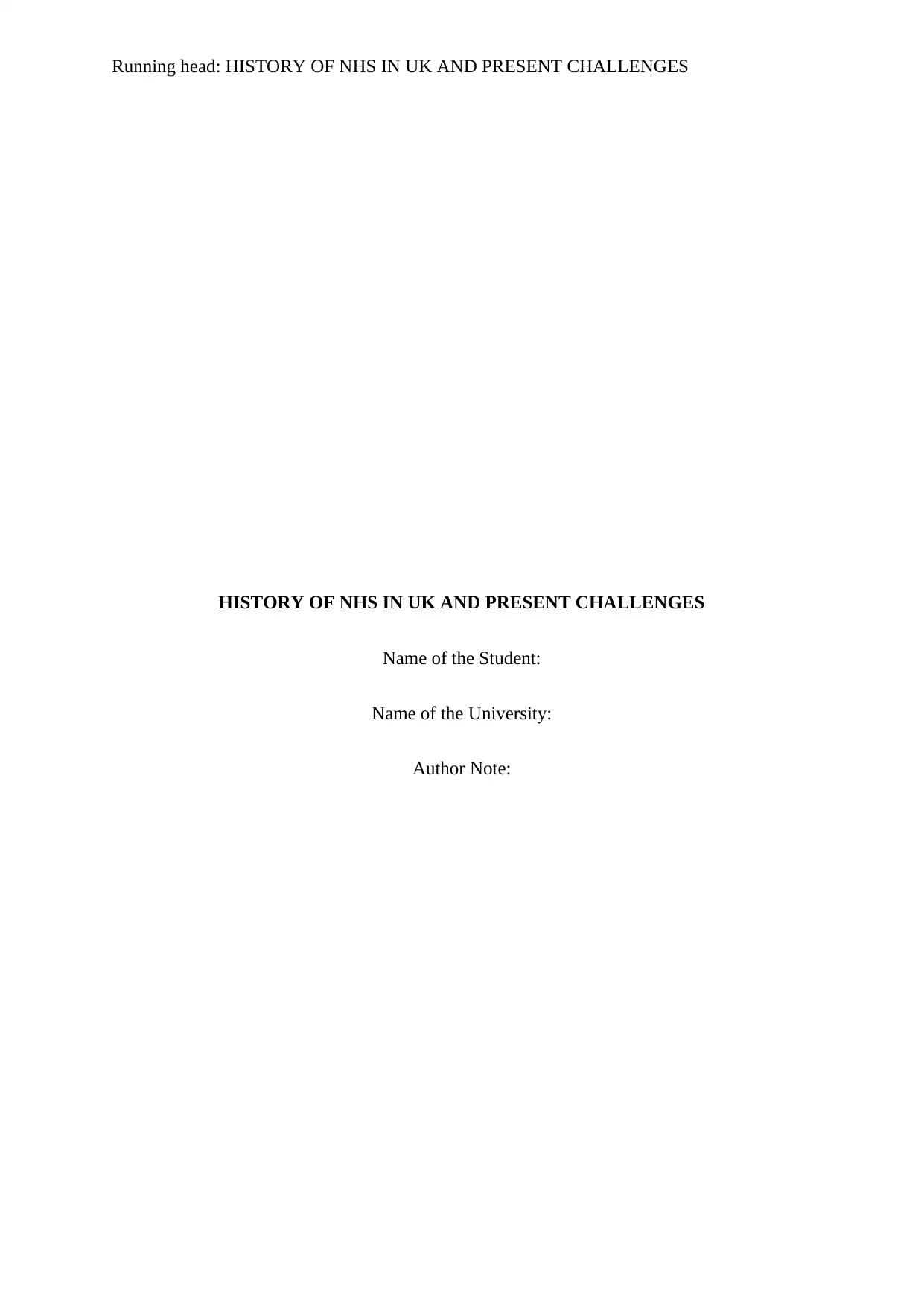
Running head: HISTORY OF NHS IN UK AND PRESENT CHALLENGES
HISTORY OF NHS IN UK AND PRESENT CHALLENGES
Name of the Student:
Name of the University:
Author Note:
HISTORY OF NHS IN UK AND PRESENT CHALLENGES
Name of the Student:
Name of the University:
Author Note:
Paraphrase This Document
Need a fresh take? Get an instant paraphrase of this document with our AI Paraphraser
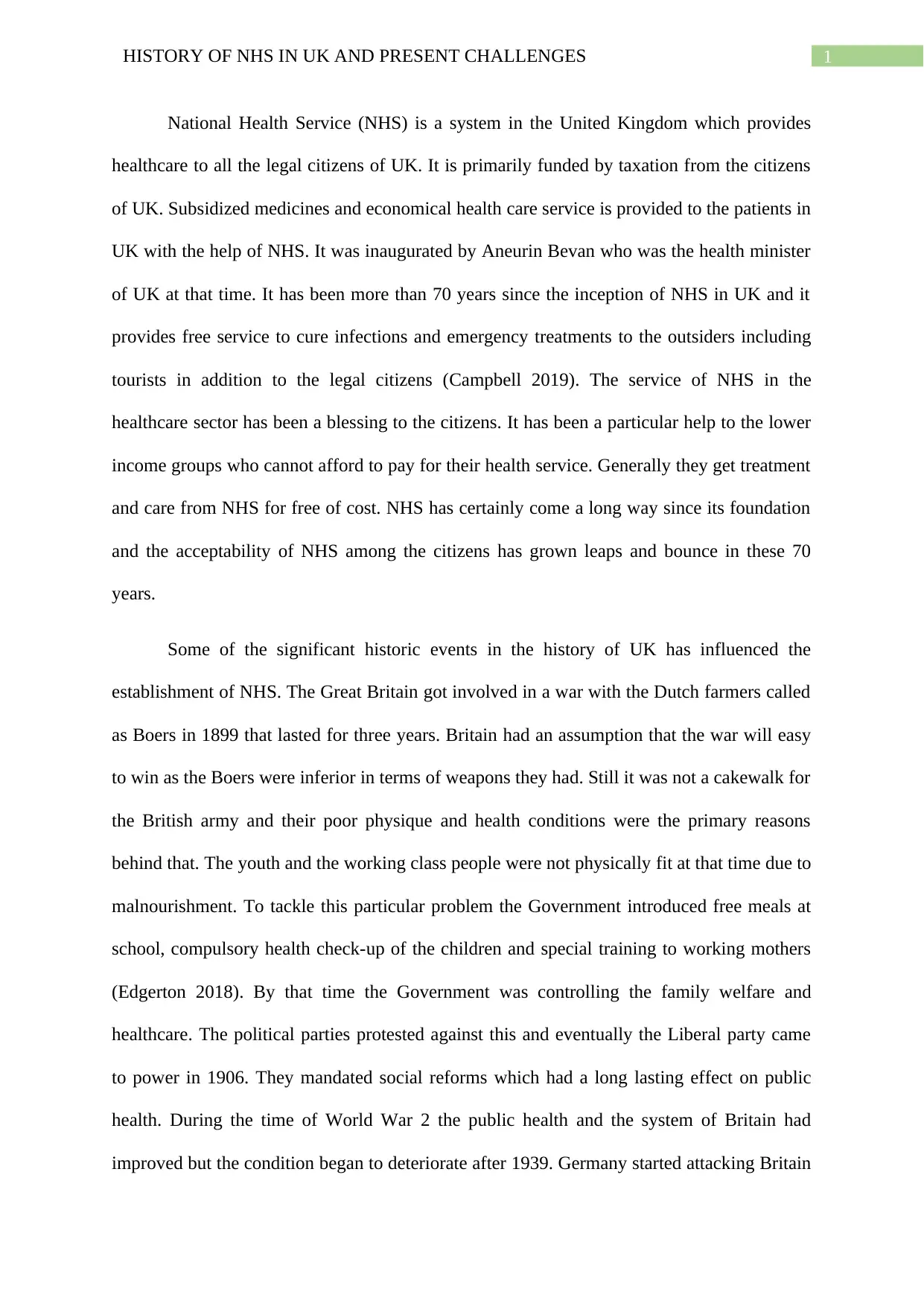
1HISTORY OF NHS IN UK AND PRESENT CHALLENGES
National Health Service (NHS) is a system in the United Kingdom which provides
healthcare to all the legal citizens of UK. It is primarily funded by taxation from the citizens
of UK. Subsidized medicines and economical health care service is provided to the patients in
UK with the help of NHS. It was inaugurated by Aneurin Bevan who was the health minister
of UK at that time. It has been more than 70 years since the inception of NHS in UK and it
provides free service to cure infections and emergency treatments to the outsiders including
tourists in addition to the legal citizens (Campbell 2019). The service of NHS in the
healthcare sector has been a blessing to the citizens. It has been a particular help to the lower
income groups who cannot afford to pay for their health service. Generally they get treatment
and care from NHS for free of cost. NHS has certainly come a long way since its foundation
and the acceptability of NHS among the citizens has grown leaps and bounce in these 70
years.
Some of the significant historic events in the history of UK has influenced the
establishment of NHS. The Great Britain got involved in a war with the Dutch farmers called
as Boers in 1899 that lasted for three years. Britain had an assumption that the war will easy
to win as the Boers were inferior in terms of weapons they had. Still it was not a cakewalk for
the British army and their poor physique and health conditions were the primary reasons
behind that. The youth and the working class people were not physically fit at that time due to
malnourishment. To tackle this particular problem the Government introduced free meals at
school, compulsory health check-up of the children and special training to working mothers
(Edgerton 2018). By that time the Government was controlling the family welfare and
healthcare. The political parties protested against this and eventually the Liberal party came
to power in 1906. They mandated social reforms which had a long lasting effect on public
health. During the time of World War 2 the public health and the system of Britain had
improved but the condition began to deteriorate after 1939. Germany started attacking Britain
National Health Service (NHS) is a system in the United Kingdom which provides
healthcare to all the legal citizens of UK. It is primarily funded by taxation from the citizens
of UK. Subsidized medicines and economical health care service is provided to the patients in
UK with the help of NHS. It was inaugurated by Aneurin Bevan who was the health minister
of UK at that time. It has been more than 70 years since the inception of NHS in UK and it
provides free service to cure infections and emergency treatments to the outsiders including
tourists in addition to the legal citizens (Campbell 2019). The service of NHS in the
healthcare sector has been a blessing to the citizens. It has been a particular help to the lower
income groups who cannot afford to pay for their health service. Generally they get treatment
and care from NHS for free of cost. NHS has certainly come a long way since its foundation
and the acceptability of NHS among the citizens has grown leaps and bounce in these 70
years.
Some of the significant historic events in the history of UK has influenced the
establishment of NHS. The Great Britain got involved in a war with the Dutch farmers called
as Boers in 1899 that lasted for three years. Britain had an assumption that the war will easy
to win as the Boers were inferior in terms of weapons they had. Still it was not a cakewalk for
the British army and their poor physique and health conditions were the primary reasons
behind that. The youth and the working class people were not physically fit at that time due to
malnourishment. To tackle this particular problem the Government introduced free meals at
school, compulsory health check-up of the children and special training to working mothers
(Edgerton 2018). By that time the Government was controlling the family welfare and
healthcare. The political parties protested against this and eventually the Liberal party came
to power in 1906. They mandated social reforms which had a long lasting effect on public
health. During the time of World War 2 the public health and the system of Britain had
improved but the condition began to deteriorate after 1939. Germany started attacking Britain
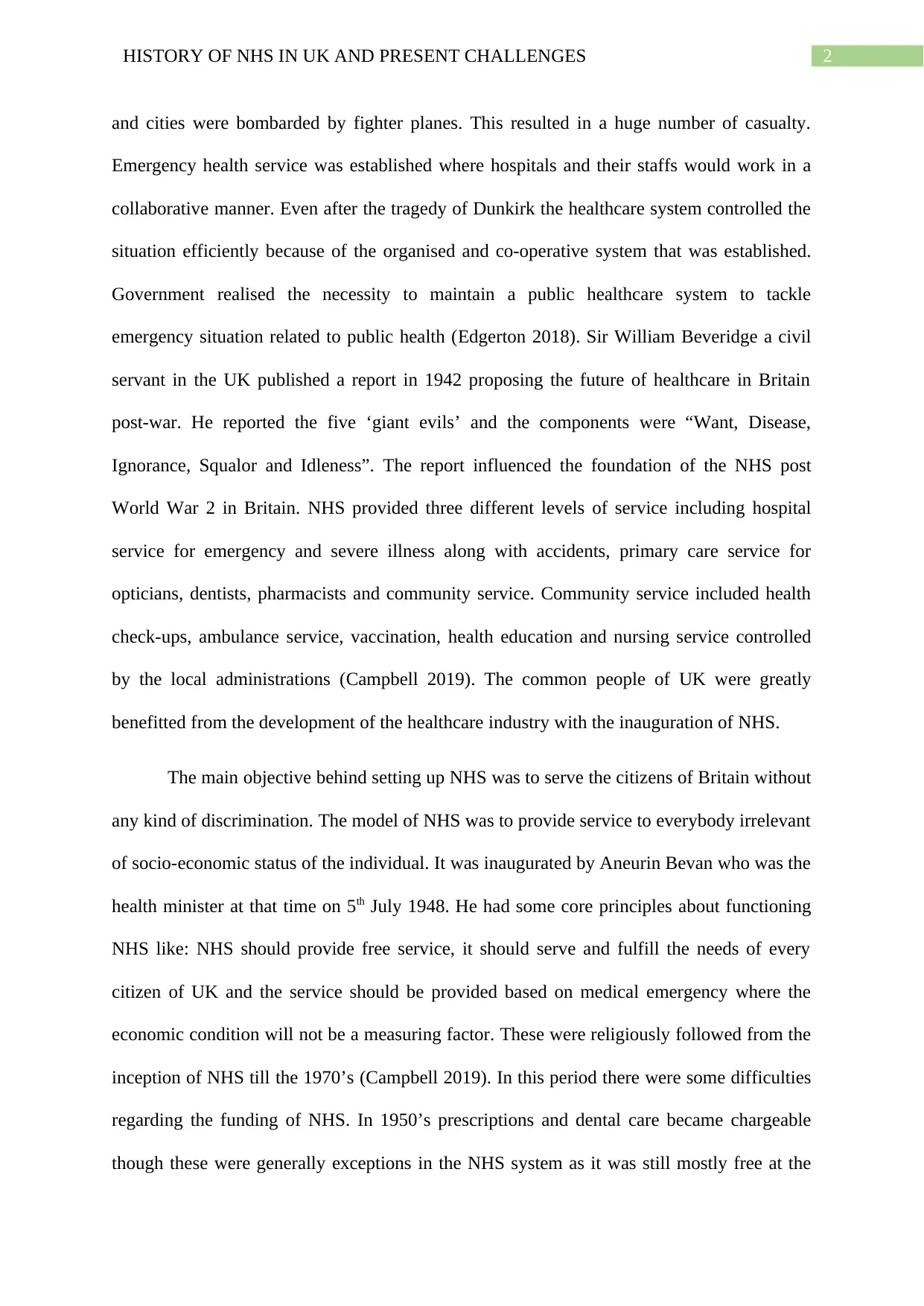
2HISTORY OF NHS IN UK AND PRESENT CHALLENGES
and cities were bombarded by fighter planes. This resulted in a huge number of casualty.
Emergency health service was established where hospitals and their staffs would work in a
collaborative manner. Even after the tragedy of Dunkirk the healthcare system controlled the
situation efficiently because of the organised and co-operative system that was established.
Government realised the necessity to maintain a public healthcare system to tackle
emergency situation related to public health (Edgerton 2018). Sir William Beveridge a civil
servant in the UK published a report in 1942 proposing the future of healthcare in Britain
post-war. He reported the five ‘giant evils’ and the components were “Want, Disease,
Ignorance, Squalor and Idleness”. The report influenced the foundation of the NHS post
World War 2 in Britain. NHS provided three different levels of service including hospital
service for emergency and severe illness along with accidents, primary care service for
opticians, dentists, pharmacists and community service. Community service included health
check-ups, ambulance service, vaccination, health education and nursing service controlled
by the local administrations (Campbell 2019). The common people of UK were greatly
benefitted from the development of the healthcare industry with the inauguration of NHS.
The main objective behind setting up NHS was to serve the citizens of Britain without
any kind of discrimination. The model of NHS was to provide service to everybody irrelevant
of socio-economic status of the individual. It was inaugurated by Aneurin Bevan who was the
health minister at that time on 5th July 1948. He had some core principles about functioning
NHS like: NHS should provide free service, it should serve and fulfill the needs of every
citizen of UK and the service should be provided based on medical emergency where the
economic condition will not be a measuring factor. These were religiously followed from the
inception of NHS till the 1970’s (Campbell 2019). In this period there were some difficulties
regarding the funding of NHS. In 1950’s prescriptions and dental care became chargeable
though these were generally exceptions in the NHS system as it was still mostly free at the
and cities were bombarded by fighter planes. This resulted in a huge number of casualty.
Emergency health service was established where hospitals and their staffs would work in a
collaborative manner. Even after the tragedy of Dunkirk the healthcare system controlled the
situation efficiently because of the organised and co-operative system that was established.
Government realised the necessity to maintain a public healthcare system to tackle
emergency situation related to public health (Edgerton 2018). Sir William Beveridge a civil
servant in the UK published a report in 1942 proposing the future of healthcare in Britain
post-war. He reported the five ‘giant evils’ and the components were “Want, Disease,
Ignorance, Squalor and Idleness”. The report influenced the foundation of the NHS post
World War 2 in Britain. NHS provided three different levels of service including hospital
service for emergency and severe illness along with accidents, primary care service for
opticians, dentists, pharmacists and community service. Community service included health
check-ups, ambulance service, vaccination, health education and nursing service controlled
by the local administrations (Campbell 2019). The common people of UK were greatly
benefitted from the development of the healthcare industry with the inauguration of NHS.
The main objective behind setting up NHS was to serve the citizens of Britain without
any kind of discrimination. The model of NHS was to provide service to everybody irrelevant
of socio-economic status of the individual. It was inaugurated by Aneurin Bevan who was the
health minister at that time on 5th July 1948. He had some core principles about functioning
NHS like: NHS should provide free service, it should serve and fulfill the needs of every
citizen of UK and the service should be provided based on medical emergency where the
economic condition will not be a measuring factor. These were religiously followed from the
inception of NHS till the 1970’s (Campbell 2019). In this period there were some difficulties
regarding the funding of NHS. In 1950’s prescriptions and dental care became chargeable
though these were generally exceptions in the NHS system as it was still mostly free at the
⊘ This is a preview!⊘
Do you want full access?
Subscribe today to unlock all pages.

Trusted by 1+ million students worldwide
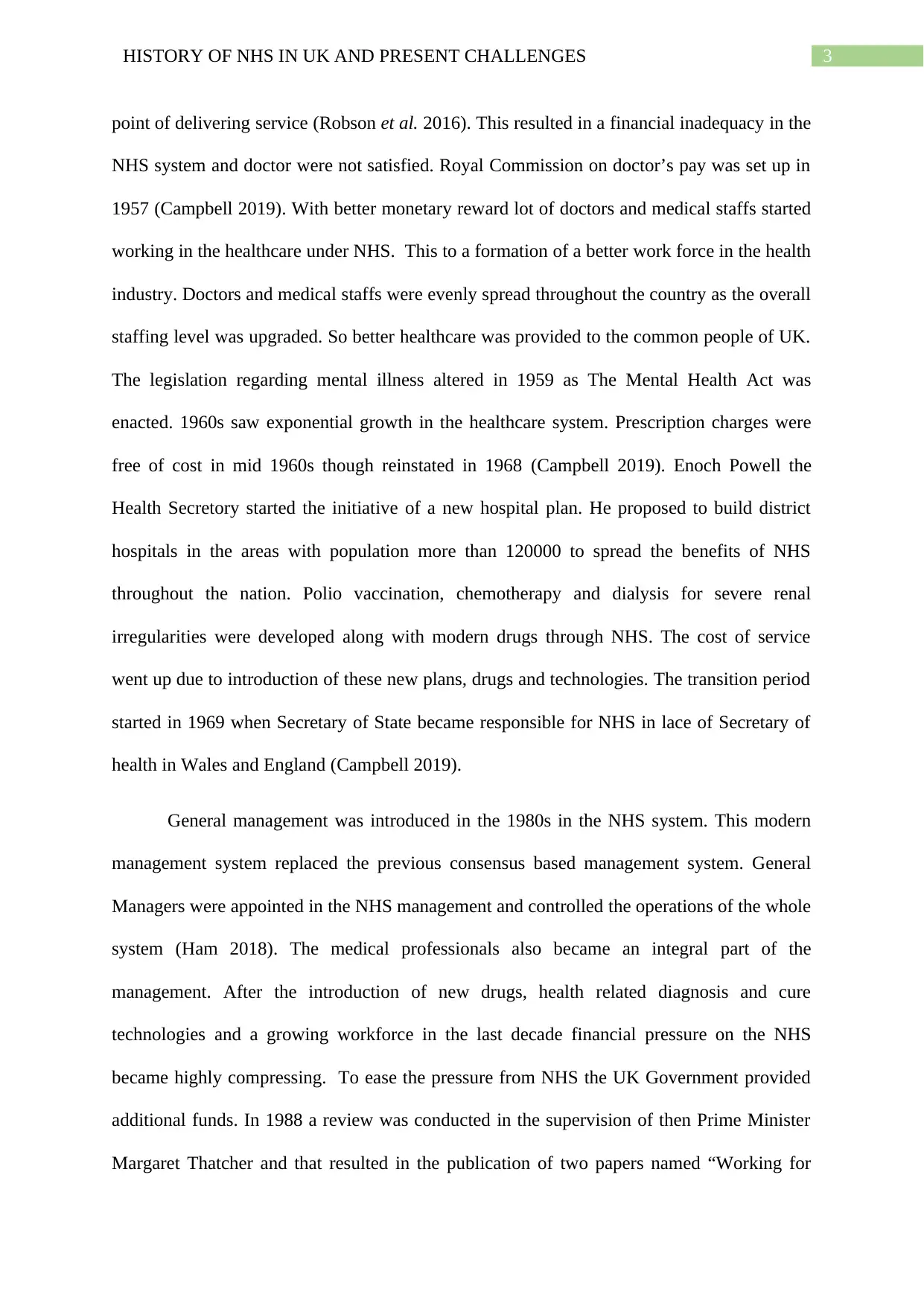
3HISTORY OF NHS IN UK AND PRESENT CHALLENGES
point of delivering service (Robson et al. 2016). This resulted in a financial inadequacy in the
NHS system and doctor were not satisfied. Royal Commission on doctor’s pay was set up in
1957 (Campbell 2019). With better monetary reward lot of doctors and medical staffs started
working in the healthcare under NHS. This to a formation of a better work force in the health
industry. Doctors and medical staffs were evenly spread throughout the country as the overall
staffing level was upgraded. So better healthcare was provided to the common people of UK.
The legislation regarding mental illness altered in 1959 as The Mental Health Act was
enacted. 1960s saw exponential growth in the healthcare system. Prescription charges were
free of cost in mid 1960s though reinstated in 1968 (Campbell 2019). Enoch Powell the
Health Secretory started the initiative of a new hospital plan. He proposed to build district
hospitals in the areas with population more than 120000 to spread the benefits of NHS
throughout the nation. Polio vaccination, chemotherapy and dialysis for severe renal
irregularities were developed along with modern drugs through NHS. The cost of service
went up due to introduction of these new plans, drugs and technologies. The transition period
started in 1969 when Secretary of State became responsible for NHS in lace of Secretary of
health in Wales and England (Campbell 2019).
General management was introduced in the 1980s in the NHS system. This modern
management system replaced the previous consensus based management system. General
Managers were appointed in the NHS management and controlled the operations of the whole
system (Ham 2018). The medical professionals also became an integral part of the
management. After the introduction of new drugs, health related diagnosis and cure
technologies and a growing workforce in the last decade financial pressure on the NHS
became highly compressing. To ease the pressure from NHS the UK Government provided
additional funds. In 1988 a review was conducted in the supervision of then Prime Minister
Margaret Thatcher and that resulted in the publication of two papers named “Working for
point of delivering service (Robson et al. 2016). This resulted in a financial inadequacy in the
NHS system and doctor were not satisfied. Royal Commission on doctor’s pay was set up in
1957 (Campbell 2019). With better monetary reward lot of doctors and medical staffs started
working in the healthcare under NHS. This to a formation of a better work force in the health
industry. Doctors and medical staffs were evenly spread throughout the country as the overall
staffing level was upgraded. So better healthcare was provided to the common people of UK.
The legislation regarding mental illness altered in 1959 as The Mental Health Act was
enacted. 1960s saw exponential growth in the healthcare system. Prescription charges were
free of cost in mid 1960s though reinstated in 1968 (Campbell 2019). Enoch Powell the
Health Secretory started the initiative of a new hospital plan. He proposed to build district
hospitals in the areas with population more than 120000 to spread the benefits of NHS
throughout the nation. Polio vaccination, chemotherapy and dialysis for severe renal
irregularities were developed along with modern drugs through NHS. The cost of service
went up due to introduction of these new plans, drugs and technologies. The transition period
started in 1969 when Secretary of State became responsible for NHS in lace of Secretary of
health in Wales and England (Campbell 2019).
General management was introduced in the 1980s in the NHS system. This modern
management system replaced the previous consensus based management system. General
Managers were appointed in the NHS management and controlled the operations of the whole
system (Ham 2018). The medical professionals also became an integral part of the
management. After the introduction of new drugs, health related diagnosis and cure
technologies and a growing workforce in the last decade financial pressure on the NHS
became highly compressing. To ease the pressure from NHS the UK Government provided
additional funds. In 1988 a review was conducted in the supervision of then Prime Minister
Margaret Thatcher and that resulted in the publication of two papers named “Working for
Paraphrase This Document
Need a fresh take? Get an instant paraphrase of this document with our AI Paraphraser
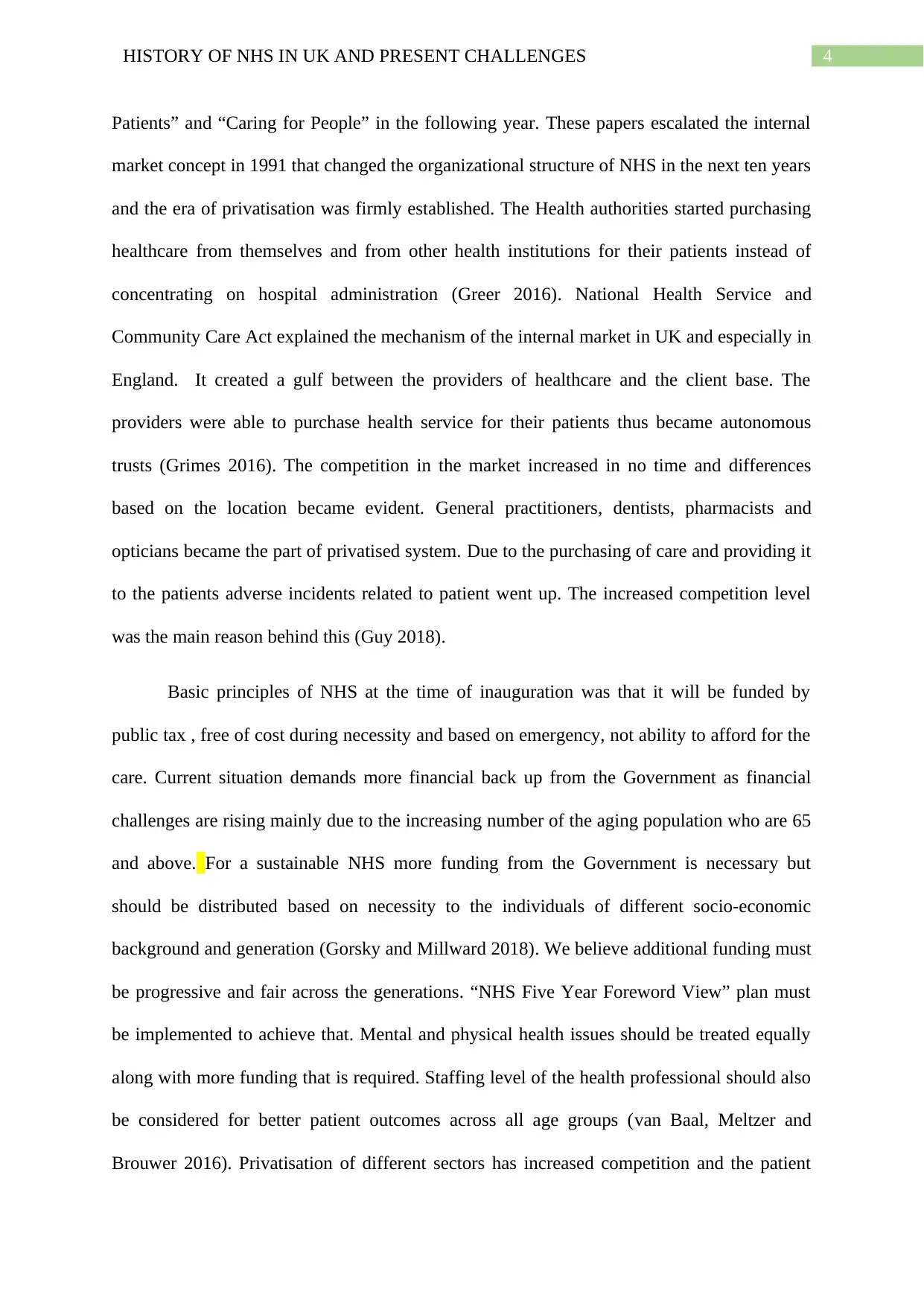
4HISTORY OF NHS IN UK AND PRESENT CHALLENGES
Patients” and “Caring for People” in the following year. These papers escalated the internal
market concept in 1991 that changed the organizational structure of NHS in the next ten years
and the era of privatisation was firmly established. The Health authorities started purchasing
healthcare from themselves and from other health institutions for their patients instead of
concentrating on hospital administration (Greer 2016). National Health Service and
Community Care Act explained the mechanism of the internal market in UK and especially in
England. It created a gulf between the providers of healthcare and the client base. The
providers were able to purchase health service for their patients thus became autonomous
trusts (Grimes 2016). The competition in the market increased in no time and differences
based on the location became evident. General practitioners, dentists, pharmacists and
opticians became the part of privatised system. Due to the purchasing of care and providing it
to the patients adverse incidents related to patient went up. The increased competition level
was the main reason behind this (Guy 2018).
Basic principles of NHS at the time of inauguration was that it will be funded by
public tax , free of cost during necessity and based on emergency, not ability to afford for the
care. Current situation demands more financial back up from the Government as financial
challenges are rising mainly due to the increasing number of the aging population who are 65
and above. For a sustainable NHS more funding from the Government is necessary but
should be distributed based on necessity to the individuals of different socio-economic
background and generation (Gorsky and Millward 2018). We believe additional funding must
be progressive and fair across the generations. “NHS Five Year Foreword View” plan must
be implemented to achieve that. Mental and physical health issues should be treated equally
along with more funding that is required. Staffing level of the health professional should also
be considered for better patient outcomes across all age groups (van Baal, Meltzer and
Brouwer 2016). Privatisation of different sectors has increased competition and the patient
Patients” and “Caring for People” in the following year. These papers escalated the internal
market concept in 1991 that changed the organizational structure of NHS in the next ten years
and the era of privatisation was firmly established. The Health authorities started purchasing
healthcare from themselves and from other health institutions for their patients instead of
concentrating on hospital administration (Greer 2016). National Health Service and
Community Care Act explained the mechanism of the internal market in UK and especially in
England. It created a gulf between the providers of healthcare and the client base. The
providers were able to purchase health service for their patients thus became autonomous
trusts (Grimes 2016). The competition in the market increased in no time and differences
based on the location became evident. General practitioners, dentists, pharmacists and
opticians became the part of privatised system. Due to the purchasing of care and providing it
to the patients adverse incidents related to patient went up. The increased competition level
was the main reason behind this (Guy 2018).
Basic principles of NHS at the time of inauguration was that it will be funded by
public tax , free of cost during necessity and based on emergency, not ability to afford for the
care. Current situation demands more financial back up from the Government as financial
challenges are rising mainly due to the increasing number of the aging population who are 65
and above. For a sustainable NHS more funding from the Government is necessary but
should be distributed based on necessity to the individuals of different socio-economic
background and generation (Gorsky and Millward 2018). We believe additional funding must
be progressive and fair across the generations. “NHS Five Year Foreword View” plan must
be implemented to achieve that. Mental and physical health issues should be treated equally
along with more funding that is required. Staffing level of the health professional should also
be considered for better patient outcomes across all age groups (van Baal, Meltzer and
Brouwer 2016). Privatisation of different sectors has increased competition and the patient
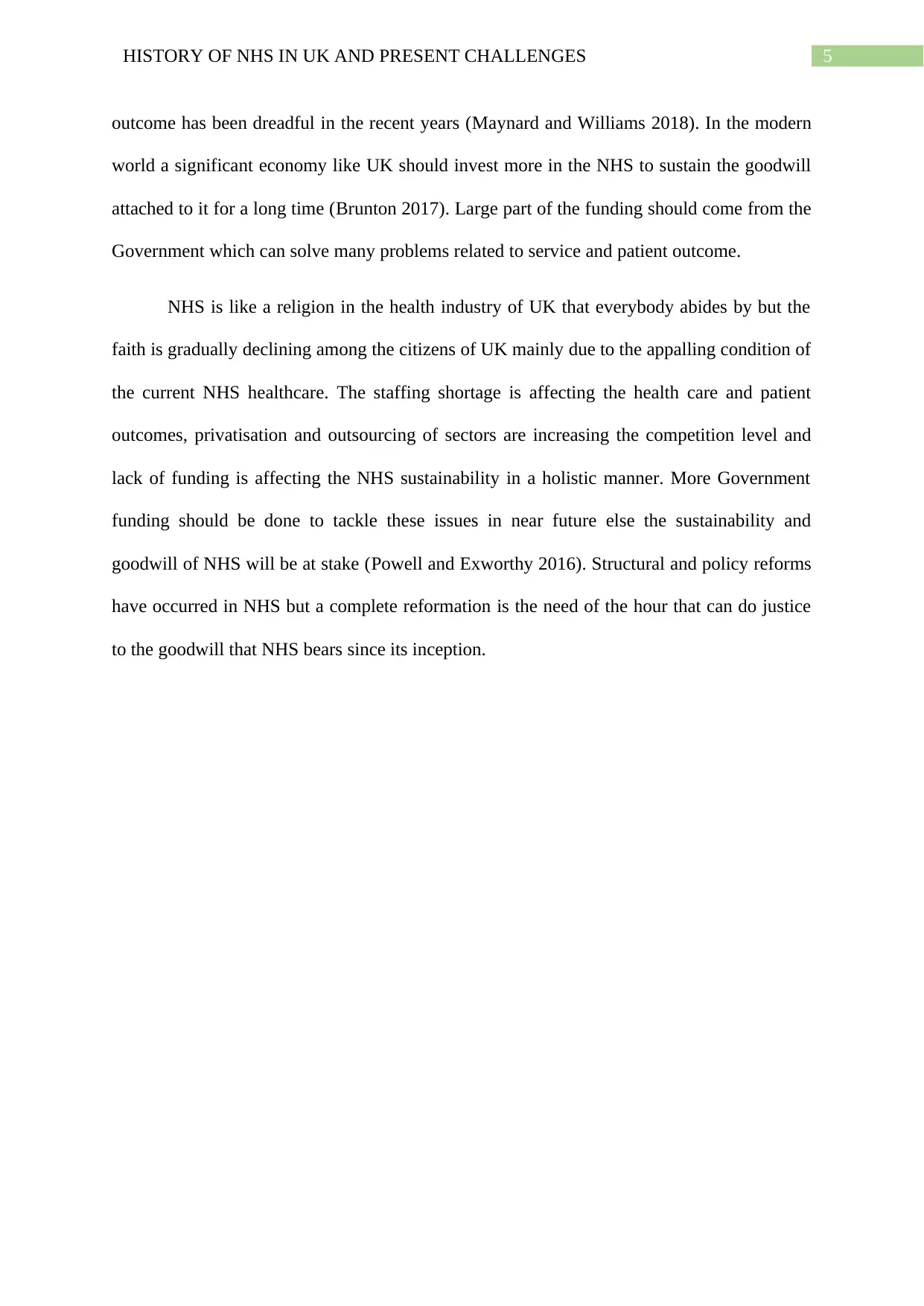
5HISTORY OF NHS IN UK AND PRESENT CHALLENGES
outcome has been dreadful in the recent years (Maynard and Williams 2018). In the modern
world a significant economy like UK should invest more in the NHS to sustain the goodwill
attached to it for a long time (Brunton 2017). Large part of the funding should come from the
Government which can solve many problems related to service and patient outcome.
NHS is like a religion in the health industry of UK that everybody abides by but the
faith is gradually declining among the citizens of UK mainly due to the appalling condition of
the current NHS healthcare. The staffing shortage is affecting the health care and patient
outcomes, privatisation and outsourcing of sectors are increasing the competition level and
lack of funding is affecting the NHS sustainability in a holistic manner. More Government
funding should be done to tackle these issues in near future else the sustainability and
goodwill of NHS will be at stake (Powell and Exworthy 2016). Structural and policy reforms
have occurred in NHS but a complete reformation is the need of the hour that can do justice
to the goodwill that NHS bears since its inception.
outcome has been dreadful in the recent years (Maynard and Williams 2018). In the modern
world a significant economy like UK should invest more in the NHS to sustain the goodwill
attached to it for a long time (Brunton 2017). Large part of the funding should come from the
Government which can solve many problems related to service and patient outcome.
NHS is like a religion in the health industry of UK that everybody abides by but the
faith is gradually declining among the citizens of UK mainly due to the appalling condition of
the current NHS healthcare. The staffing shortage is affecting the health care and patient
outcomes, privatisation and outsourcing of sectors are increasing the competition level and
lack of funding is affecting the NHS sustainability in a holistic manner. More Government
funding should be done to tackle these issues in near future else the sustainability and
goodwill of NHS will be at stake (Powell and Exworthy 2016). Structural and policy reforms
have occurred in NHS but a complete reformation is the need of the hour that can do justice
to the goodwill that NHS bears since its inception.
⊘ This is a preview!⊘
Do you want full access?
Subscribe today to unlock all pages.

Trusted by 1+ million students worldwide
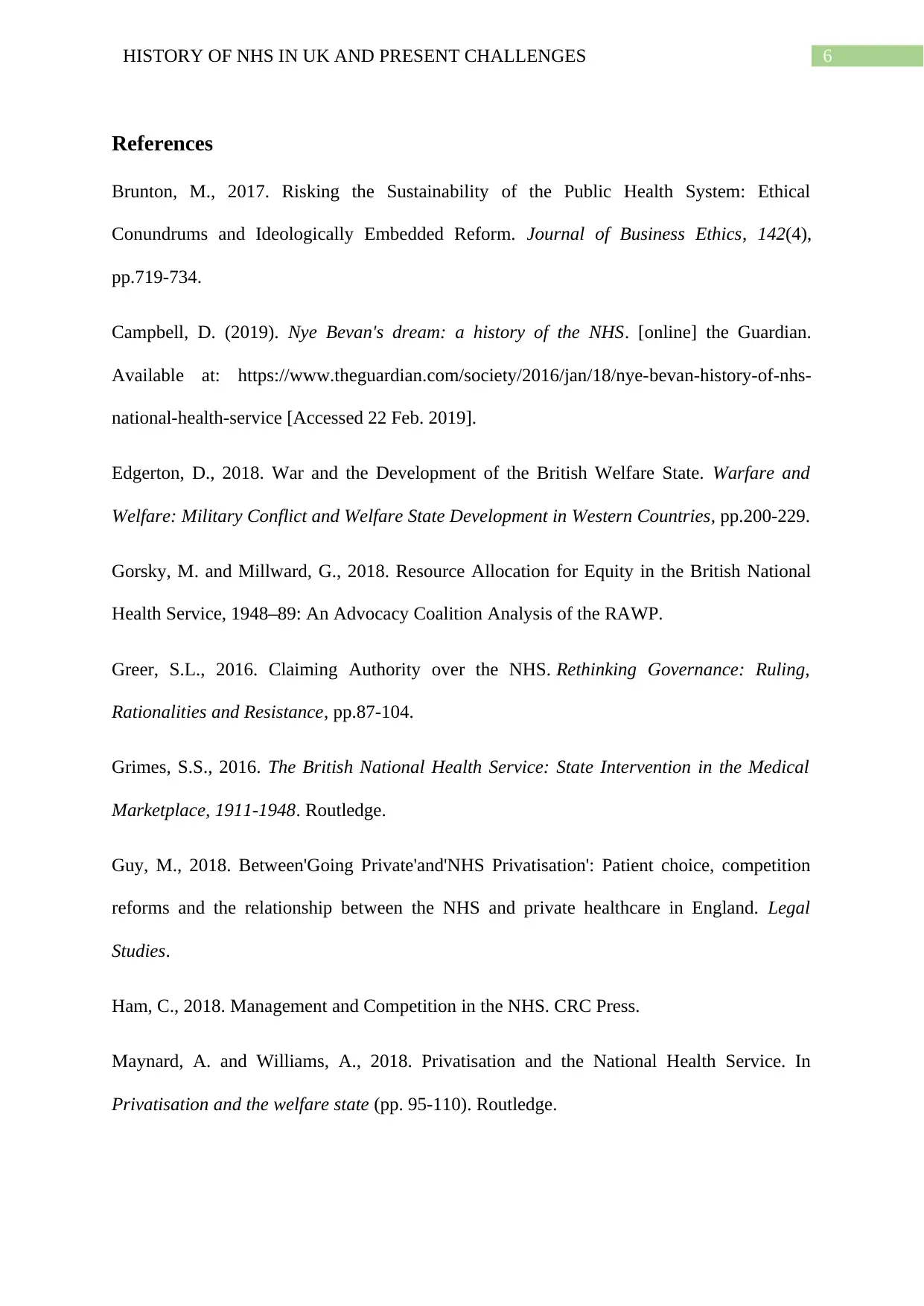
6HISTORY OF NHS IN UK AND PRESENT CHALLENGES
References
Brunton, M., 2017. Risking the Sustainability of the Public Health System: Ethical
Conundrums and Ideologically Embedded Reform. Journal of Business Ethics, 142(4),
pp.719-734.
Campbell, D. (2019). Nye Bevan's dream: a history of the NHS. [online] the Guardian.
Available at: https://www.theguardian.com/society/2016/jan/18/nye-bevan-history-of-nhs-
national-health-service [Accessed 22 Feb. 2019].
Edgerton, D., 2018. War and the Development of the British Welfare State. Warfare and
Welfare: Military Conflict and Welfare State Development in Western Countries, pp.200-229.
Gorsky, M. and Millward, G., 2018. Resource Allocation for Equity in the British National
Health Service, 1948–89: An Advocacy Coalition Analysis of the RAWP.
Greer, S.L., 2016. Claiming Authority over the NHS. Rethinking Governance: Ruling,
Rationalities and Resistance, pp.87-104.
Grimes, S.S., 2016. The British National Health Service: State Intervention in the Medical
Marketplace, 1911-1948. Routledge.
Guy, M., 2018. Between'Going Private'and'NHS Privatisation': Patient choice, competition
reforms and the relationship between the NHS and private healthcare in England. Legal
Studies.
Ham, C., 2018. Management and Competition in the NHS. CRC Press.
Maynard, A. and Williams, A., 2018. Privatisation and the National Health Service. In
Privatisation and the welfare state (pp. 95-110). Routledge.
References
Brunton, M., 2017. Risking the Sustainability of the Public Health System: Ethical
Conundrums and Ideologically Embedded Reform. Journal of Business Ethics, 142(4),
pp.719-734.
Campbell, D. (2019). Nye Bevan's dream: a history of the NHS. [online] the Guardian.
Available at: https://www.theguardian.com/society/2016/jan/18/nye-bevan-history-of-nhs-
national-health-service [Accessed 22 Feb. 2019].
Edgerton, D., 2018. War and the Development of the British Welfare State. Warfare and
Welfare: Military Conflict and Welfare State Development in Western Countries, pp.200-229.
Gorsky, M. and Millward, G., 2018. Resource Allocation for Equity in the British National
Health Service, 1948–89: An Advocacy Coalition Analysis of the RAWP.
Greer, S.L., 2016. Claiming Authority over the NHS. Rethinking Governance: Ruling,
Rationalities and Resistance, pp.87-104.
Grimes, S.S., 2016. The British National Health Service: State Intervention in the Medical
Marketplace, 1911-1948. Routledge.
Guy, M., 2018. Between'Going Private'and'NHS Privatisation': Patient choice, competition
reforms and the relationship between the NHS and private healthcare in England. Legal
Studies.
Ham, C., 2018. Management and Competition in the NHS. CRC Press.
Maynard, A. and Williams, A., 2018. Privatisation and the National Health Service. In
Privatisation and the welfare state (pp. 95-110). Routledge.
Paraphrase This Document
Need a fresh take? Get an instant paraphrase of this document with our AI Paraphraser
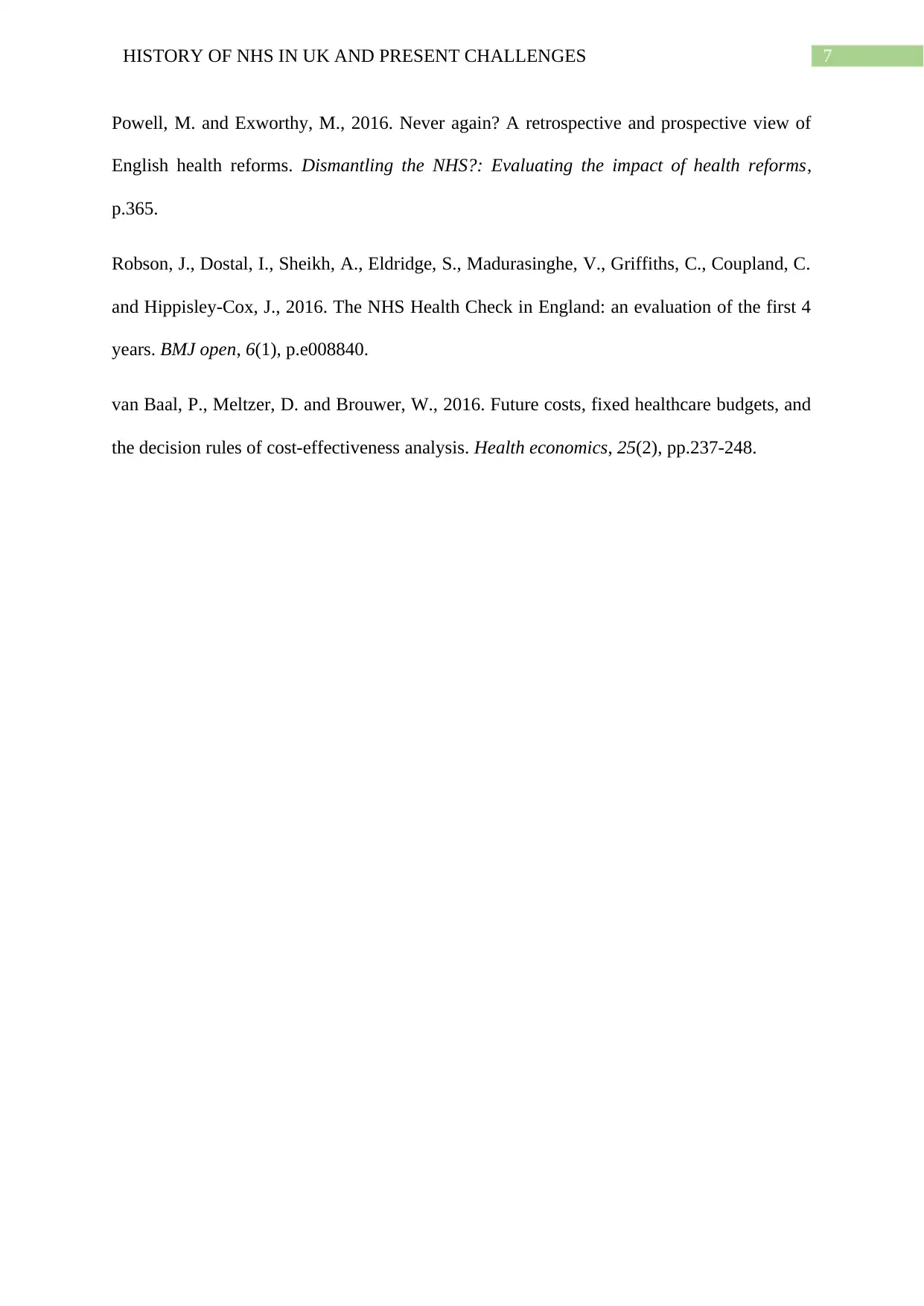
7HISTORY OF NHS IN UK AND PRESENT CHALLENGES
Powell, M. and Exworthy, M., 2016. Never again? A retrospective and prospective view of
English health reforms. Dismantling the NHS?: Evaluating the impact of health reforms,
p.365.
Robson, J., Dostal, I., Sheikh, A., Eldridge, S., Madurasinghe, V., Griffiths, C., Coupland, C.
and Hippisley-Cox, J., 2016. The NHS Health Check in England: an evaluation of the first 4
years. BMJ open, 6(1), p.e008840.
van Baal, P., Meltzer, D. and Brouwer, W., 2016. Future costs, fixed healthcare budgets, and
the decision rules of cost‐effectiveness analysis. Health economics, 25(2), pp.237-248.
Powell, M. and Exworthy, M., 2016. Never again? A retrospective and prospective view of
English health reforms. Dismantling the NHS?: Evaluating the impact of health reforms,
p.365.
Robson, J., Dostal, I., Sheikh, A., Eldridge, S., Madurasinghe, V., Griffiths, C., Coupland, C.
and Hippisley-Cox, J., 2016. The NHS Health Check in England: an evaluation of the first 4
years. BMJ open, 6(1), p.e008840.
van Baal, P., Meltzer, D. and Brouwer, W., 2016. Future costs, fixed healthcare budgets, and
the decision rules of cost‐effectiveness analysis. Health economics, 25(2), pp.237-248.
1 out of 8
Related Documents
Your All-in-One AI-Powered Toolkit for Academic Success.
+13062052269
info@desklib.com
Available 24*7 on WhatsApp / Email
![[object Object]](/_next/static/media/star-bottom.7253800d.svg)
Unlock your academic potential
Copyright © 2020–2026 A2Z Services. All Rights Reserved. Developed and managed by ZUCOL.




